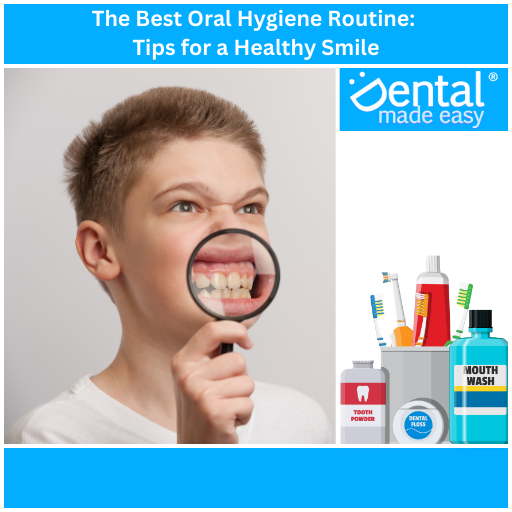Maintaining a healthy smile goes beyond regular dental checkups—your daily oral hygiene routine plays a crucial role in keeping your teeth and gums in top shape. At Dental Made Easy, we believe that prevention is key, and with the right habits, you can protect your oral health for years to come. In this article, we’ll share the best tips and practices for an effective oral hygiene routine, from brushing techniques to flossing and beyond, so you can enjoy a confident and healthy smile every day.
5 Key Components of the Best Oral Hygiene Routine
Here are the key components that contribute to optimal dental health:
- Choosing the Right Toothbrush: Opt for soft bristle toothbrushes, as they are gentle on your gums while effectively removing plaque. When deciding between electric vs manual toothbrushes, consider that electric brushes can provide a more consistent brushing technique and may be easier for some individuals to use effectively.
- Fluoride Toothpaste Benefits: Select toothpaste that contains fluoride, as it helps strengthen tooth enamel and prevent cavities. Look for toothpaste ingredients like xylitol or baking soda, which can further enhance oral health.
- Brushing Technique: Employ proper tooth brushing techniques by holding your toothbrush at a 45-degree angle to your gums and using gentle circular motions to clean all surfaces of your teeth. Aim to brush for at least two minutes, twice a day.
- Flossing Importance: Flossing is crucial for effective plaque removal between teeth where toothbrushes can’t reach. Use a proper flossing method by gently sliding the floss between each tooth in a C-shape and moving it up and down against the sides of each tooth.
- Mouthwash Benefits: Incorporating mouthwash into your daily dental routine can provide additional protection against cavities and gum disease by reducing bacteria in the mouth and freshening breath.
By integrating these components into your daily dental routine, you will enhance effective plaque removal and promote overall oral health, ensuring that you maintain bright smiles for years to come.
The Role of Diet in Maintaining Optimal Oral Hygiene
Maintaining optimal oral hygiene goes beyond regular brushing and flossing; diet also plays a role in the health of your teeth and gums. Certain foods contribute significantly to dental well-being, while others can have detrimental effects.
- Calcium Rich Foods: Foods rich in calcium, such as dairy products, leafy greens, and almonds, are essential for strengthening tooth enamel. Additionally, crunchy fruits and vegetables like apples and carrots can help clean teeth naturally by stimulating saliva production. Saliva is vital for neutralizing acids produced by bacteria in the mouth, thus reducing the risk of cavities.
- Sugars: On the other hand, sugar has a notorious impact on oral health. When sugar is consumed, it fuels harmful bacteria that produce acid as a byproduct. This acid erodes tooth enamel over time, leading to cavities and decay. Therefore, it’s important to limit sugary snacks and beverages in your diet.
- Hydration: Hydration also plays a key role in oral hygiene. Drinking plenty of water helps maintain saliva levels, which are necessary for keeping the mouth clean and preventing dry mouth—a condition that can lead to increased plaque buildup. When it comes to beverages, water is undoubtedly one of the best drinks for oral hygiene. It not only aids hydration but also helps rinse away food debris. Conversely, sugary drinks or those high in acidity can significantly harm your teeth over time.
- Smoking: Lastly, smoking has detrimental effects on oral hygiene by contributing to gum disease and bad breath while staining teeth. Avoiding tobacco products is essential for maintaining both overall health and optimal oral care.
In summary, adopting a balanced diet rich in nutrients while minimizing sugar intake can greatly enhance your oral hygiene efforts—ensuring that your smile remains healthy for years to come.
Common Mistakes to Avoid
Many individuals unknowingly make common mistakes that can lead to long-term issues. Here are some common mistakes you should avoid:
- Over Brushing: One common error is over-brushing, which can cause damage to the enamel and gums. It’s crucial to use gentle strokes with a soft-bristled toothbrush rather than applying excessive pressure.
- Neglecting Flossing: Another critical mistake is neglecting the importance of flossing. Many people underestimate its role in removing plaque and food particles from between teeth, where a toothbrush cannot reach. Regular flossing helps prevent cavities and gum disease.
- Skipping Regular Dental Check-ups: Routine visits allow dentists to catch potential problems early on and provide professional cleanings that are essential for maintaining oral health. Ignoring these appointments could result in more severe issues down the line.
- Using Expired Products: Expired toothpaste or mouthwash may not provide the intended benefits and could even harm your teeth.
- Improper Mouthwash Use: Mouthwash should be used as a supplement to brushing and flossing, not as a replacement; using it incorrectly may lead to inadequate cleaning of your mouth.
By being mindful of these common pitfalls in your oral hygiene routine, you can ensure healthier teeth and gums for years to come.
Keep Your Smile Bright with Expert Advice from Dental Made Easy
A consistent oral hygiene routine is the foundation of a healthy smile. If you want personalized advice on how to improve your dental care habits or need a professional cleaning, the team at Dental Made Easy is here to help. Contact us today to schedule an appointment and take the next step towards achieving your best oral health!







